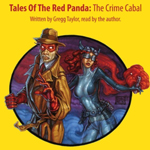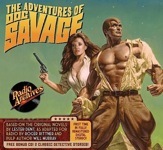
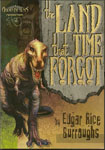 The Land That Time Forgot
The Land That Time Forgot
By Edgar Rice Burroughs; Read by Brian Holsopple
3 CDs – 3.5 hours – [UNABRIDGED]
Publisher: Audio Realms
ISBN: 9781897304334
Themes: / Science Fiction / Pulp / Ju-jutsu /
Repeat after me: Pulp is a great genre, but not all pulp is great. And some of it isn’t very good at all, I’m afraid.
I lead with this because I’ve noticed that pulp often gets a free pass from its advocates. Fans will leap to the defense of poorly plotted, boring, or otherwise not well-written stories and pulp-inspired films with a simple, “well, it’s pulp”–as if this fact somehow makes the genre above criticism.
Now, I happen to be a big fan of pulp, but I can also recognize a flawed example when I see it. Even when its written by Edgar Rice Burroughs, one of pulp’s grand masters (see many of his wonderful Tarzan and John Carter stories).
I’m sorry to say that Burroughs’ The Land that Time Forgot is not very good. It’s not as bad as, say, Magic Kingdom For Sale: Sold, and I’ve read worse, but when compared to the best pulp has to offer–i.e., almost anything written by Robert E. Howard–The Land that Time Forgot simply does not measure up.
Part of my problem with this book may be the fact that I listened to an audio recording produced by Audio Realms, delivered in uninspired fashion by narrator Brian Holsopple. Audio Realms is also responsible for producing the fantastic series The Dark Worlds of H.P. Lovecraft, read by Wayne June (who is a terrific narrator), but I found this particular entry in their catalogue rather poor.
To be fair, Holsopple doesn’t exactly have Lovecraft at the top of his game to work with. Some of the dialogue in The Land that Time Forgot is so stilted and cornball that I found myself literally cringing behind the steering wheel while driving into work. Here’s one less-than-stellar example:
“You have evolved a beautiful philosophy,” I said. “It fills such a longing in the human breast. It is full, it is satisfying, it is ennobling. What wonderous strides toward perfection the human race might have made if the first man had evolved it and it had persisted until now as the creed of humanity.”
“I don’t like irony,” she said; “it indicates a small soul.”
“What other sort of soul, then, would you expect from ‘a comic little figure hopping from the cradle to the grave’?” I inquired. “And what difference does it make, anyway, what you like and what you don’t like? You are here for but an instant, and you mustn’t take yourself too seriously.”
She looked up at me with a smile. “I imagine that I am frightened and blue,” she said, “and I know that I am very, very homesick and lonely.” There was almost a sob in her voice as she concluded. It was the first time that she had spoken thus to me. Involuntarily, I laid my hand upon hers where it rested on the rail.
I mean, this stuff makes the lines delivered in Days of Our Lives seem like John Keats in comparison.
The Land that Time Forgot tells the tale of Tyler Bowen, an American on a merchant vessel whose ship is attacked by a World War I German U-boat. Bowen survives and with the help of some British sailors manages to overpower the U-boat’s crew. Bowen is eventually betrayed by one of his own men who smashes the U-boat’s instruments in an attempt to doom the ship’s crew. When Bowen finally learns who his betrayer is, the man on his deathbed reveals his secrets like an unmasked villain from Scooby-Doo:
“I did it alone,” he said. “I did it because I hate you–I hate all your kind. I was kicked out of your shipyard at Santa Monica. I was locked out of California. I am an I. W. W. I became a German agent–not because I love them, for I hate them too–but because I wanted to injure Americans, whom I hated more. I threw the wireless apparatus overboard. I destroyed the chronometer and the sextant. I devised a scheme for varying the compass to suit my wishes. I told Wilson that I had seen the girl talking with von Schoenvorts, and I made the poor egg think he had seen her doing the same thing. I am sorry–sorry that my plans failed. I hate you.”
And he would have succeeded if it wasn’t for you meddling kids.
Lost at sea and low on food and water, Bowen and his men land on the island of Caprona, a literal island that time forgot. It’s inhabited by dinosaurs of every age as well as ice-age beasts and men in various stages of evolution. Bowen then spends the rest of the book rescuing a stranded damosel from the hands of lustful Neanderthal men and hungry dinosaurs, as well as kicking the crap out of primitive men. Oh, I didn’t mention that Bowen happens to be a physical specimen and a master of judo? Here’s my favorite passage:
Three of the warriors were sitting upon me, trying to hold me down by main strength and awkwardness, and they were having their hands full in the doing, I can tell you. I don’t like to appear conceited, but I may as well admit that I am proud of my strength and the science that I have acquired and developed in the directing of it–that and my horsemanship I always have been proud of.
And now, that day, all the long hours that I had put into careful study, practice and training brought me in two or three minutes a full return upon my investment. Californians, as a rule, are familiar with ju-jutsu, and I especially had made a study of it for several years, both at school and in the gym of the Los Angeles Athletic Club, while recently I had had, in my employ, a Jap who was a wonder at the art. It took me just about thirty seconds to break the elbow of one of my assailants, trip another and send him stumbling backward among his fellows, and throw the third completely over my head in such a way that when he fell his neck was broken.
“Californians as a rule are familiar with ju-jutsu?” “I am proud of my strength and the science that I have acquired and developed in the directing of it?” “A Jap who was a wonder at the art?” Man, if this isn’t Mystery Science Theatre 3000 material than I don’t know what is.
About the only thing that The Land the Time Forgot has going for it is that it isn’t entirely boring, if you like one mindless action scene strung together after the next. But, in summation, if you’re looking for a good representative of the pulp genre, look elsewhere.
Posted by Brian Murphy

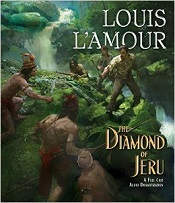 The Diamond of Jeru
The Diamond of Jeru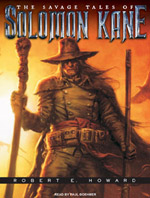 The Savage Tales of Solomon Kane
The Savage Tales of Solomon Kane


